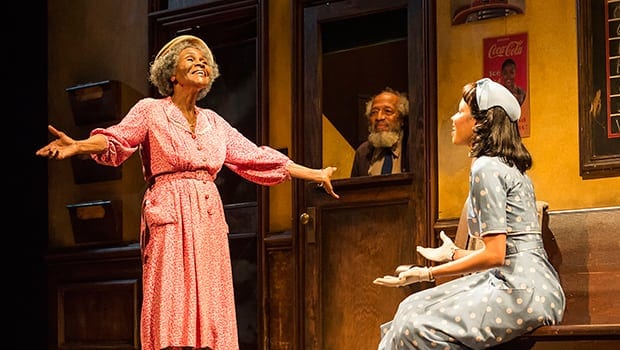

Cicely Tyson, Blair Underwood and Vanessa Williams in “The Trip to Bountiful,” presented by ArtsEmerson: The World On Stage through December 7 at the Emerson/Cutler Majestic Theatre.
As delicate and strong as the actor in its lead role, Cicely Tyson, the wondrous Broadway production of Horton Foote’s classic American play, The Trip to Bountiful is on stage through December 7 at the Emerson/Cutler Majestic Theatre in Boston.
Presented by ArtsEmerson: The World On Stage, the production, in Boston for its only East Coast engagement, also features Blair Underwood and Vanessa Williams.
But its heart is Tyson, 89, in her role as Mrs. Carrie Watts, who is determined against all odds to fulfill her dream — to make one last visit to her rural hometown, Bountiful, Texas.
In her tiny, bird-like body, Tyson embodies the fragility and strength of Mrs. Watts. Accompanied by a superb cast, including not only actors with star wattage but also a fine six-member ensemble, she is both a precarious and powerful presence. Just as she might be expected to collapse from the obstacles that come her way, she surges with renewed strength, with a song or dance to rouse spirits. Portraying a woman who is fierce in will and fragile in body, Tyson’s performance celebrates the risks and power of acting itself.
In gentle, profound plays set in his Texas hometown, revered playwright Horton Foote chronicled the lives of ordinary people.
The Trip to Bountiful debuted in 1953 as a live television drama starring Lillian Gish and Eva Marie Saint. Three decades later, in 1985, the film version starred Geraldine Page, who won an Oscar as best actress. After seeing the movie, Tyson told her agent that her dream was to complete her career with such a part. Nearly three decades later she fulfilled her wish.
In 2013, Tyson returned to Broadway after a 30-year hiatus as Carrie Watts and received Tony, Drama Desk and Outer Critics Circle awards for Best Actress in a Play.
Her achievement crowns her long career portraying a host of courageous women, including her landmark lead role in the 1974 TV movie, The Autobiography of Miss Jane Pittman, which won two Emmy Awards.
As Carrie Watts, Tyson delivers the thrill of watching a great actress in the role of a lifetime.
The Trip to Bountiful has a simple plot that turns on the determination of Mrs. Watts to undertake her journey to Bountiful, and her succession of encounters with people along the way, each a stirring give-and-take.
Transferring his Broadway production intact, Michael Wilson directs the Boston staging with sets by Jeff Cowie, costumes by Van Broughton Ramsey and lighting by Rui Rita. Sharing an umber palette, the period sets and costumes evoke an era when gentlemen wore jackets and ladies were attired in demure but stylish hats and dresses.
With one intermission, the two-hour production unfolds as a series of scenes, each an episode bringing Mrs. Watts closer to Bountiful. Sets are works of stage magic, conjuring a cramped apartment, a bus station suggesting the wider world, an intimate seat for two in the back of a bus (acknowledging segregated seating) suspended in a starry night sky, a cozy local bus station, and finally, a Monet-like landscape with a dilapidated house that is overgrown with brambles and family memories.
The play opens in the jam-packed apartment in Houston that Mrs. Watts shares with her dutiful son Ludie (Underwood) and hellish daughter-in-law Jessie Mae (Williams). Ludie is summoning the courage to ask his employer for a raise and trying to keep the peace between these dueling women. An agile Tyson shows the frisky and wily side of her character — leaping with glee and dashing around when Ludie and Jessie Mae look the other way but mugging a slow hobbling walk when they watch her.
She survives Jessie Mae’s harshness by assorted games, including hide-and-seek. Keeping her pension check out of Jessie Mae’s reach, she also hides her strength and her dream of escape. The play and the fullness of her character truly take off when, her pension check packed in her purse, Mrs. Watts sets out for Bountiful.
When they realize she is missing, a worried Ludie and seething Jessie Mae pick up her trail at the city bus station, where they learn she has headed for Bountiful. Observing the fraught couple are passengers in the waiting room, couples and single travelers dressed for travel. Like a Greek chorus of citizens, they are appalled at the brassy behavior of Jessie Mae.
Among them is Thelma, a caring and wise young woman who befriends Mrs. Watts and accompanies her on the bus to the next town. Jurnee Smollett-Bell is genuine in the role. Like Mrs. Watts, we are reluctant to part ways with her when she reaches her destination.
Presiding at the local bus station is Roy, a ticket master with a kind soul and the bearded aspect of a Biblical sage. Arthur French is a natural as Roy, who informs Carrie of her town’s losses and the deaths of long-time friends and neighbors.
Mrs. Watts collapses when she hears the news but then springs up, enlisting Thelma and Roy in singing and dancing as she rouses her spirits and resolve. She will sleep on a bench in the darkened station and seek a ride to Bountiful the next morning.
Meanwhile, the town sheriff arrives and arranges for Ludie to come and pick up his mother. Yet Mrs. Watts persuades him that she cannot return to Houston without fulfilling her dream. Devon Abner is utterly convincing as the button-down sheriff whose compassion makes all the difference.
Meeting at Bountiful, Mrs. Watts, Ludie and even Jessie Mae come to see each other anew. Ludie begins to take charge, telling his wife, “We have to live together. Live together in peace.” An acidic daughter-in-law gains a measure of respect for others.
Tyson’s Mrs. Watts draws all into her journey to Bountiful, including us.






